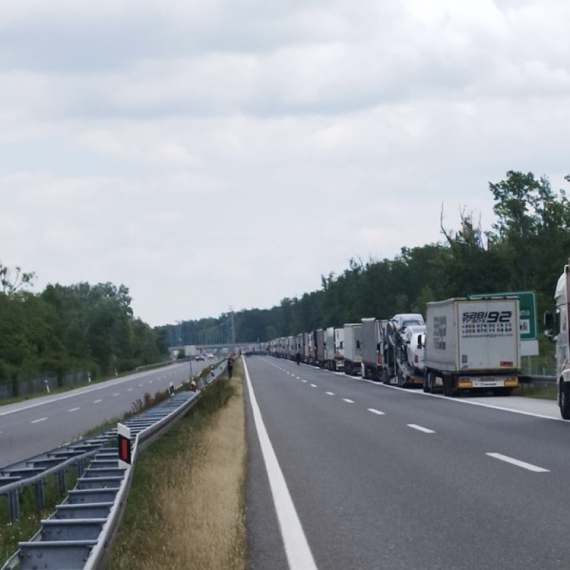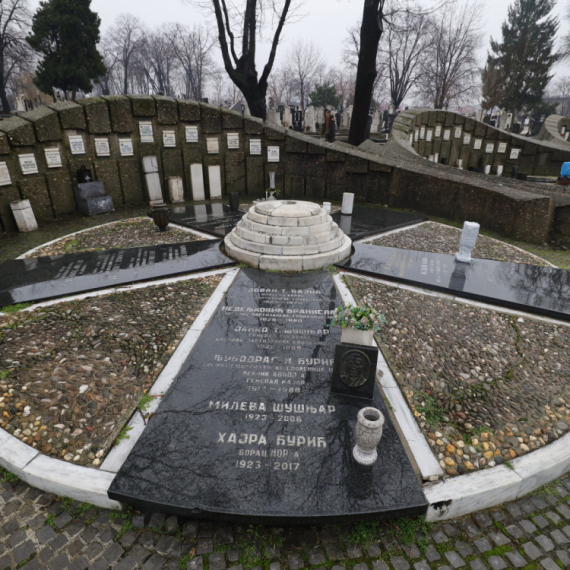EU against Kosovo partition, unilateral moves
EU warned Friday against a partition of Kosovo and unilateral declaration of independence, Reuters reported.
Friday, 07.09.2007.
09:45

EU warned Friday against a partition of Kosovo and unilateral declaration of independence, Reuters reported. Swedish Foreign Minister Carl Bildt said any such move "could spark similar separatist demands from ethnic groups in neighboring Bosnia and elsewhere in the region." EU against Kosovo partition, unilateral moves "It is very dangerous ... you would open up something for the future that would be very difficult to handle," Bildt, a former Bosnia administrator, told reporters at an informal meeting of EU foreign ministers in the Portuguese coastal town of Viana do Castelo, the agency reported. Bildt also spoke on Friday against recognizing a possible unilateral declaration of independence: "If people around the world declare independence we do not normally recognize them." EU Enlargement Commissioner Olli Rehn told Reuters: "Neither of the parties (Serbia or Kosovo) has proposed partition nor has any party in the international community." The position of the EU could prove vital. Diplomats working on Kosovo believe its leadership would only go ahead with a unilateral declaration with support from Washington - which in turn would like to see the EU follow suit. Rehn called on all parties - including the United States and Russia - to avoid unilateral action. Bildt said: "If Europe is ready to take the lead I think that lead will be respected by Washington." The European Union foreing policy chiefs were originally scheduled to discuss Kosovo today, but the meeting was postponed for Saturday. The ministers will make an effort to avoid significant differences within the EU regarding the future status of Kosovo and try to agree on a recognition of the Serbian province if negotiations fall through, Reuters reported earlier Friday. “Kosovo is probably the greatest challenge that Europe is facing,” Portugal’s Foreign Minister Luis Amado said. The possibility that the Kosovo Albanians will proclaim independence on December 10 will dominate the EU debate. The EU could be thrown into disarray if Kosovo declares independence in December in the absence of a UN-backed agreement between Belgrade and Pristina, the BBC reports today. Some countries, including the UK, would follow the U.S. in recognizing the self-declared state, others, including Spain and Greece, would not. This would jeopardize the planned launch of the EU's largest overseas mission, which is intended to supervise Kosovo's independence, and guarantee the rule of law, taking over from the existing UN mission in Kosovo. The EU's representative to the EU-Russia-U.S. Troika hoping to engineer a UN deal, Wolfgang Ischinger, said that an agreement was "very unlikely", and will warn the ministers to start thinking now about how to maintain unity if no deal is reached. EU foreign ministers in Viana do Castelo Friday (EPA/Tanjug) “Fear of setting precedents” Wolfgang Petritsch is concerned the EU may not be able to achieve unity over Kosovo. “What concerns me the most is European Union’s unified stance over Kosovo’s status settlement. If it falls short of that, the discussion of the EU common foreign and security policy would be reduced to a topic of small-talk,” the Austrian ambassador to UN in Geneva said in an interview with Vienna daily Die Presse. Petritsch, who is also former EU envoy to Kosovo, and the union's chief negotiator at the Rambouillet talks, noted that the EU mission will loose in strength without a single front on the issue. “Some EU states harbor fears that Kosovo’s solution would set a precedent,” he said and went on to explain, “It will, in a way, but only a unified and active EU will be able to pursue its policy, and that is why I hope skeptics will become aware of this as well.” Petritsch also acknowledged that Belgrade was “right to say that if Kosovo broke off from Serbia, the act would be in violation of international law.” “From the formal perspective, the claim is somewhat true. However, the entire situation has to be considered,” he said, reminding that since the 1999 NATO intervention, "an international thesis has developed about the responsibility of each state to protect its citizens." “Serbia directly breached this in Kosovo in the 1990s by the systematic expulsion of 850,000 Albanians, which had obviously been planned,” said Petritsch. “Milosevic lost the moral right to go on as if nothing had happened. Besides, someone from Belgrade will have to explain to me what they have to offer to two million citizens in the province, for them to abandon pursuing independence. I fear there are no satisfactory answers to that,” he argued. Commenting on claims that Serbia should have been more involved in the status settlement process, Petritsch noted that UN Special Envoy to Kosovo Martti Ahtisaari and his deputy Albert Rohan performed their task well. “At the same time, I regret that the international community failed to sufficiently explore the Serbian arguments, and that Belgrade did not expound on its formula ‘Short of independence, more than autonomy’,” he argued, wondering whether Belgrade would embrace an ethnic Albanian president or minister, and how such a confederation might function. Asked whether Serbia should have been told in 1999 it had lost a war as a result losing Kosovo as well, Petritsch confirmed that, with hindsight, it would certainly have been better to have pinned the loss of the province to Milosevic and not to a democratic government as could be the case now. However, the Austrian diplomat argued that it would have been difficult to secure Russia’s approval back in 1999. Wolfgang Petritsch (FoNet, archive)
EU against Kosovo partition, unilateral moves
"It is very dangerous ... you would open up something for the future that would be very difficult to handle," Bildt, a former Bosnia administrator, told reporters at an informal meeting of EU foreign ministers in the Portuguese coastal town of Viana do Castelo, the agency reported.Bildt also spoke on Friday against recognizing a possible unilateral declaration of independence: "If people around the world declare independence we do not normally recognize them."
EU Enlargement Commissioner Olli Rehn told Reuters: "Neither of the parties (Serbia or Kosovo) has proposed partition nor has any party in the international community."
The position of the EU could prove vital. Diplomats working on Kosovo believe its leadership would only go ahead with a unilateral declaration with support from Washington - which in turn would like to see the EU follow suit.
Rehn called on all parties - including the United States and Russia - to avoid unilateral action.
Bildt said: "If Europe is ready to take the lead I think that lead will be respected by Washington."
The European Union foreing policy chiefs were originally scheduled to discuss Kosovo today, but the meeting was postponed for Saturday.
The ministers will make an effort to avoid significant differences within the EU regarding the future status of Kosovo and try to agree on a recognition of the Serbian province if negotiations fall through, Reuters reported earlier Friday.
“Kosovo is probably the greatest challenge that Europe is facing,” Portugal’s Foreign Minister Luis Amado said.
The possibility that the Kosovo Albanians will proclaim independence on December 10 will dominate the EU debate.
The EU could be thrown into disarray if Kosovo declares independence in December in the absence of a UN-backed agreement between Belgrade and Priština, the BBC reports today.
Some countries, including the UK, would follow the U.S. in recognizing the self-declared state, others, including Spain and Greece, would not.
This would jeopardize the planned launch of the EU's largest overseas mission, which is intended to supervise Kosovo's independence, and guarantee the rule of law, taking over from the existing UN mission in Kosovo.
The EU's representative to the EU-Russia-U.S. Troika hoping to engineer a UN deal, Wolfgang Ischinger, said that an agreement was "very unlikely", and will warn the ministers to start thinking now about how to maintain unity if no deal is reached.
“Fear of setting precedents”

“What concerns me the most is European Union’s unified stance over Kosovo’s status settlement. If it falls short of that, the discussion of the EU common foreign and security policy would be reduced to a topic of small-talk,” the Austrian ambassador to UN in Geneva said in an interview with Vienna daily Die Presse.
Petritsch, who is also former EU envoy to Kosovo, and the union's chief negotiator at the Rambouillet talks, noted that the EU mission will loose in strength without a single front on the issue.
“Some EU states harbor fears that Kosovo’s solution would set a precedent,” he said and went on to explain, “It will, in a way, but only a unified and active EU will be able to pursue its policy, and that is why I hope skeptics will become aware of this as well.”
Petritsch also acknowledged that Belgrade was “right to say that if Kosovo broke off from Serbia, the act would be in violation of international law.”
“From the formal perspective, the claim is somewhat true. However, the entire situation has to be considered,” he said, reminding that since the 1999 NATO intervention, "an international thesis has developed about the responsibility of each state to protect its citizens."
“Serbia directly breached this in Kosovo in the 1990s by the systematic expulsion of 850,000 Albanians, which had obviously been planned,” said Petritsch.
“Milošević lost the moral right to go on as if nothing had happened. Besides, someone from Belgrade will have to explain to me what they have to offer to two million citizens in the province, for them to abandon pursuing independence. I fear there are no satisfactory answers to that,” he argued.
Commenting on claims that Serbia should have been more involved in the status settlement process, Petritsch noted that UN Special Envoy to Kosovo Martti Ahtisaari and his deputy Albert Rohan performed their task well.
“At the same time, I regret that the international community failed to sufficiently explore the Serbian arguments, and that Belgrade did not expound on its formula ‘Short of independence, more than autonomy’,” he argued, wondering whether Belgrade would embrace an ethnic Albanian president or minister, and how such a confederation might function.
Asked whether Serbia should have been told in 1999 it had lost a war as a result losing Kosovo as well, Petritsch confirmed that, with hindsight, it would certainly have been better to have pinned the loss of the province to Milošević and not to a democratic government as could be the case now.
However, the Austrian diplomat argued that it would have been difficult to secure Russia’s approval back in 1999.














































Komentari 22
Pogledaj komentare